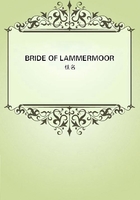
第137章
Who comes from the bridal chamber?
It is Azrael, the angel of death.
Thalaba.
AFTER the dreadful scene that had taken place at the castle, Lucy was transported to her own chamber, where she remained for some time in a state of absolute stupor. Yet afterwards, in the course of the ensuing day, she seemed to have recovered, not merely her spirits and resolution, but a sort of flighty levity, that was foreign to her character and situation, and which was at times chequered by fits of deep silence and melancholy and of capricious pettishness. Lady Ashton became much alarmed and consulted the family physicians. But as her pulse indicated no change, they could only say that the disease was on the spirits, and recommended gentle exercise and amusement. Miss Ashton never alluded to what had passed in the state-room. It seemed doubtful even if she was conscious of it, for she was often observed to raise her hands to her neck, as if in search of the ribbon that had been taken from it, and mutter, in surprise and discontent, when she could not find it, "It was the link that bound me to life."Notwithstanding all these remarkable symptoms, Lady Ashton was too deeply pledged to delay her daughter's marriage even in her present state of health. It cost her much trouble to keep up the fair side of appearances towards Bucklaw. She was well aware, that if he once saw any reluctance on her daughter's part, he would break off the treaty, to her great personal shame and dishonour. She therefore resolved that, if Lucy continued passive, the marriage should take place upon the day that had been previously fixed, trusting that a change of place, of situation, and of character would operate a more speedy and effectual cure upon the unsettled spirits of her daughter than could be attained by the slow measures which the medical men recommended. Sir William Ashton's views of family aggrandisement, and his desire to strengthen himself against the measures of the Marquis of A----, readily induced him to acquiesce in what he could not have perhaps resisted if willing to do so. As for the young men, Bucklaw and Colonel Ashton, they protested that, after what had happened, it would be most dishonourable to postpone for a single hour the time appointed for the marriage, as it would be generally ascribed to their being intimidated by the intrusive visit and threats of Ravenswood.
Bucklaw would indeed have been incapable of such precipitation, had he been aware of the state of Miss Ashton's health, or rather of her mind. But custom, upon these occasions, permitted only brief and sparing intercourse between the bridegroom and the betrothed; a circumstance so well improved by Lady Ashton, that Bucklaw neither saw nor suspected the real state of the health and feelings of his unhappy bride.
On the eve of the bridal day, Lucy appeared to have one of her fits of levity, and surveyed with a degree of girlish interest the various preparations of dress, etc., etc., which the different members of the family had prepared for the occasion.
The morning dawned bright and cheerily. The bridal guests assembled in gallant troops from distant quarters. Not only the relations of Sir William Ashton, and the still more dignified connexions of his lady, together with the numerous kinsmen and allies of the bridegroom, were present upon this joyful ceremony, gallantly mounted, arrayed, and caparisoned, but almost every Presbyterian family of distinction within fifty miles made a point of attendance upon an occasion which was considered as giving a sort of triumph over the Marquis of A----, in the person of his kinsman. Splendid refreshments awaited the guests on their arrival, and after these were finished, the cray was "To horse." The bride was led forth betwixt her brother Henry and her mother. Her gaiety of the preceding day had given rise [place] to a deep shade of melancholy, which, however, did not misbecome an occasion so momentous. There was a light in her eyes and a colour in her cheek which had not been kindled for many a day, and which, joined to her great beauty, and the splendour of her dress, occasioned her entrance to be greeted with an universal murmur of applause, in which even the ladies could not refrain from joining. While the cavalcade were getting to horse, Sir William Ashton, a man of peace and of form, censured his son Henry for having begirt himself with a military sword of preposterous length, belonging to his brother, Colonel Ashton.
"If you must have a weapon," he said, "upon such a peaceful occasion, why did you not use the short poniard sent from Edinburgh on purpose?"The boy vindicated himself by saying it was lost.
"You put it out of the way yourself, I suppose," said his father, "out of ambition to wear that preposterous thing, which might have served Sir William Wallace. But never mind, get to horse now, and take care of your sister."The boy did so, and was placed in the centre of the gallant train. At the time, he was too full of his own appearance, his sword, his laced cloak, his feathered hat, and his managed horse, to pay much regard to anything else; but he afterwards remembered to the hour of his death, that when the hand of his sister, by which she supported hersel on the pillion behind him, touched his own, it felt as wet and cold as sepulchral marble.
Glancing wide over hill and dale, the fair bridal procession at last reached the parish church, which they nearly filled; for, besides domestics, above a hundred gentlemen and ladies were present upon the occasion. The marriage ceremony was performed according to the rites of the Presbyterian persuasion, to which Bucklaw of late had judged it proper to conform.